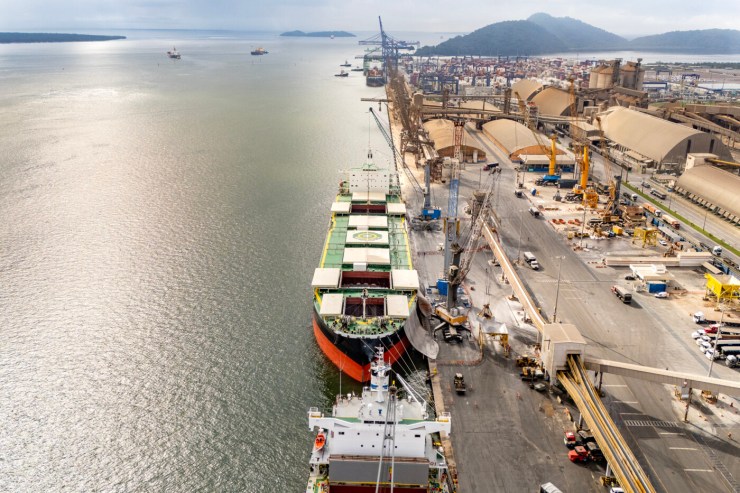According to a survey presented during a lecture on logistical challenges held at the 35th edition of the Show Rural in Cascavel, PR, Brazil has more than 3.2 million trucks, of which almost 50% are capable of handling freight because they are registered with the National Land Transportation Agency (ANTT). In addition to forwarding and transporting products in the domestic market, Brazil is responsible for 50% of the international transportation in Latin America.

Emerson Wagner talks about integrated solutions, in early February, in Paraná
Another piece of data presented by the speaker, Emerson Wagner, from Totvs, in Cascavel, which draws a lot of attention, is that estimates show that the flow of cars in the city that is the main integration point of Mercosur: Foz do Iguaçu, is over 200 thousand cargo vehicles that cross the border every year. “Foz do Iguaçu is the largest international transport integration channel in Brazil, and the majority of the products transported are grains,” Emerson points out.
The speaker presented a project that is being developed and aims to make logistics in transport more efficient, aiming to serve the international market, with an emphasis on South American countries, benefiting transporters that provide these services and that operate in other countries that provide domestic transport, aiming to provide service on a single platform.
“The big news is that this will be an exclusive solution for Brazil and will serve companies that operate in our country and also abroad, such as Paraguay and Argentina. Our goal is to build a connected solution, with integration of software and services that includes and is efficient in the operational chain, making logistics transport more practical and efficient, connecting with customs areas at the borders,” he explains.
Integrated customs
Businesspeople who work in international transportation know that one of the biggest bottlenecks in the sector is the differences in legislation between countries. “For example, when a company is going to transport goods to Bolivia, it needs to purchase software from that country, but it also needs to purchase programs from other countries it will pass through before reaching Bolivia. With this new tool, the idea is that everything will be integrated, which will make international transportation easier and more practical. This way, you won’t need to look for parallel solutions in each country, because our system will be certified by the transportation legislation of those countries and will also offer integrated management with customs, receiving the necessary information, increasing and improving transportation transit time, facilitating and generating insurance services, and advance payments to drivers,” says Emerson.
Films
The president of the Commercial and Business Association of Foz do Iguaçu, PR, (Acifi), Danilo Vendruscolo, also participated in the lecture and spoke about the project that Acifi is leading. “We see the problems and challenges of road logistics as a great opportunity to organize coordinated border management projects,” he explained.
During the event, Danilo presented the results of the 1st International Forum on Sustainable Multimodal Logistics (Films), held in Foz do Iguaçu, in 2022, by (Acifi), which together with organized civil society, entities, cooperatives and the productive sector in general rescued the Bioceanic railway corridor project, which is a technical study regarding the Capricorn axis prepared by BNDES in 2011.
According to Danilo, the Forum resulted in the creation of six working groups, involving the participation of members from the following countries: Argentina, Brazil, Chile, Paraguay and Uruguay. The permanent working groups are: 1st coordinated border management; 2nd production and trade; 3rd multimodal logistics integration; 4th air integration; 5th tourism and 6th universities.
The president also discussed another project, developed by the company Procomex, which will require an investment of more than US$1,500,000 to be implemented. “To conduct this survey, we spoke with all the agents involved in the process. After eight months, the project was finalized and filed with the BNDES on October 7, 2022. We are in negotiations and there is a high probability that these funds will be released,” he added.
Danilo also said that the implementation of this plan was requested by the Brazilian Federal Revenue Service itself. “We will implement this project, which will be a pilot project in South America and will facilitate the transportation management process. Therefore, implementation requires public and private resources and monitoring by several institutions,” he said.
He adds that the diversity of legal systems in certain sections and/or countries makes the work of truck drivers very difficult. “There is a high degree of subjectivity on the part of the public bodies and agents involved in customs and inspection, compromising the smooth operation of the Corridor. This results in unjustified delays in the inspection process and in the release of cargo at the border,” he comments.

President of Acifi, Danilo Vendrusculo
The president of Acifi listed and presented some points that they are fighting to improve. “Today, there is multiple external inspection, which is the need for inspection of cargo and documentation by the customs authorities of each country, at each territorial crossing. We want to improve this service, seeking the standardization of customs and required documentation, demanding uniformity in the operating hours of customs, seeking the standardization of computerized systems used in customs administration and operations. All of this is aimed at facilitating border procedures”, he informs.
Role of universities
Universities also play an important role. Through the Araucária Foundation, universities in Brazil, Paraguay, Argentina and Chile are having the opportunity to research the Capricorn Corridor and present suggestions for improvements, through scientific results.
2nd edition of Films
The 2nd edition of the International Forum on Sustainable Multimodal Logistics of the Capricorn Bioceanic Corridor will be held in the city of Foz do Iguaçu from September 14 to 16. The objective is to develop joint actions between the countries: Argentina, Bolivia, Brazil, Chile, Paraguay, Peru and Uruguay, aiming at the construction of logistics solutions with competitive costs at an international level, attracting new investments and stimulating trade and tourism between the countries of the Southern Cone.
To stay up to date and aware of everything that is happening in the livestock sector, access the free digital edition of Cattle, Grains and Machinery. Happy reading!




